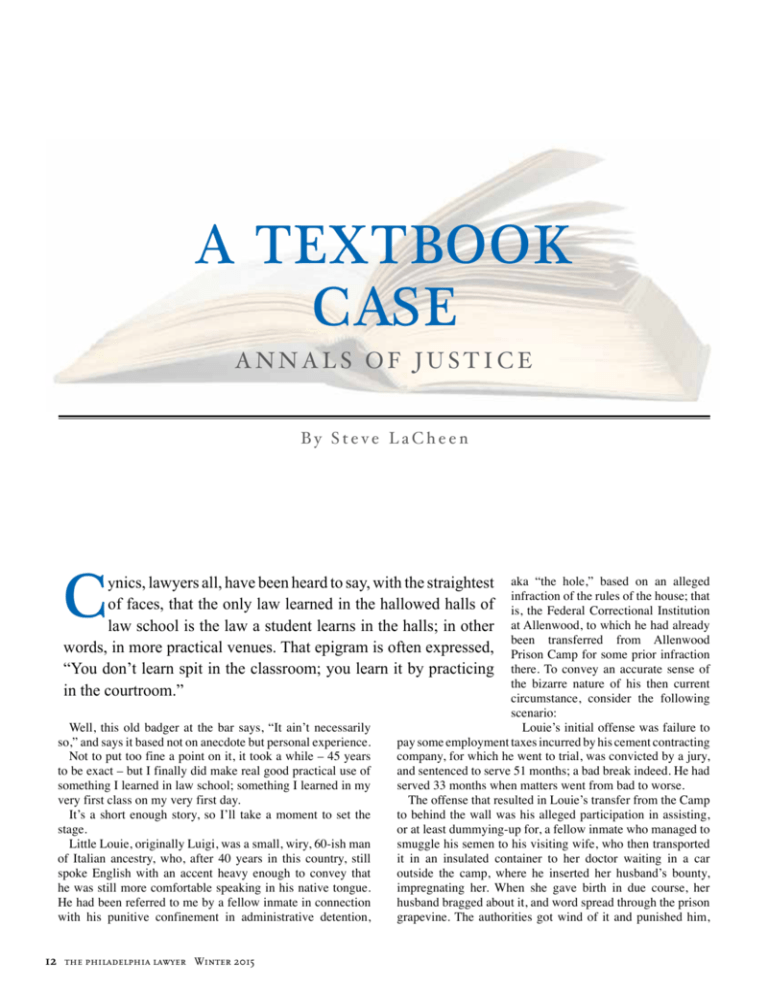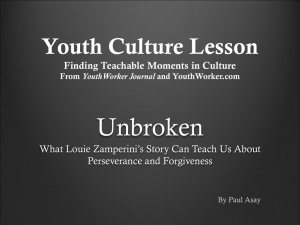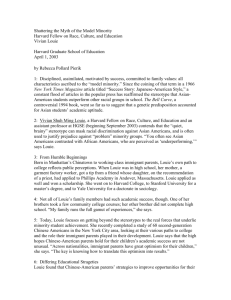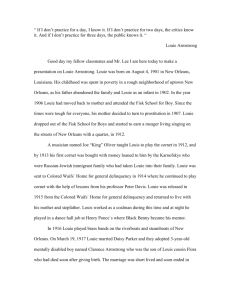A TexTbook CAse - Philadelphia Bar Association
advertisement

A Textbook case Annals of justice By Steve LaCheen C aka “the hole,” based on an alleged infraction of the rules of the house; that of faces, that the only law learned in the hallowed halls of is, the Federal Correctional Institution law school is the law a student learns in the halls; in other at Allenwood, to which he had already been transferred from Allenwood words, in more practical venues. That epigram is often expressed, Prison Camp for some prior infraction “You don’t learn spit in the classroom; you learn it by practicing there. To convey an accurate sense of the bizarre nature of his then current in the courtroom.” circumstance, consider the following scenario: Well, this old badger at the bar says, “It ain’t necessarily Louie’s initial offense was failure to so,” and says it based not on anecdote but personal experience. pay some employment taxes incurred by his cement contracting Not to put too fine a point on it, it took a while – 45 years company, for which he went to trial, was convicted by a jury, to be exact – but I finally did make real good practical use of and sentenced to serve 51 months; a bad break indeed. He had something I learned in law school; something I learned in my served 33 months when matters went from bad to worse. very first class on my very first day. The offense that resulted in Louie’s transfer from the Camp It’s a short enough story, so I’ll take a moment to set the to behind the wall was his alleged participation in assisting, stage. or at least dummying-up for, a fellow inmate who managed to Little Louie, originally Luigi, was a small, wiry, 60-ish man smuggle his semen to his visiting wife, who then transported of Italian ancestry, who, after 40 years in this country, still it in an insulated container to her doctor waiting in a car spoke English with an accent heavy enough to convey that outside the camp, where he inserted her husband’s bounty, he was still more comfortable speaking in his native tongue. impregnating her. When she gave birth in due course, her He had been referred to me by a fellow inmate in connection husband bragged about it, and word spread through the prison with his punitive confinement in administrative detention, grapevine. The authorities got wind of it and punished him, ynics, lawyers all, have been heard to say, with the straightest 12 the philadelphia lawyer Winter 2015 and his alleged co-conspirators, because no one was willing to inform how the deed was done; specifically, which prison personnel had been bribed to allow the “wannabe” dad (who had been celebrated in the press as “Sperm Boy” when word got out), to spill the beans as to exactly how the sowing of his seed had been accomplished. So, Little Louie found himself transferred from the Camp to the FCI. And that was only his second bad break. The worst was yet to come, resulting in his transfer from general population to administrative segregation. The incident that triggered that additional punishment was his alleged misuse of his telephone privileges. That disciplinary charge was based upon the translation of a statement Little Louie made to his own son on the prison telephone, all of which calls were overtly monitored. Speaking in Italian to his son about Louie’s younger brother, who had refused to post bail for his own son, who apparently had fallen into drug use and was not attending to the family business, what Louie said, was translated as follows: “You tell my stupido brother, if I was there, I’d break his head with a two-by-four.” That, according to the enthralled monitor, constituted a threat of violence, a violation of the institution’s rules that got Louie transferred from his dorm in general population to administrative segregation. And that was when Lou’s son, a pharmacist on Long Island, contacted me. Since Louie was serving a “new law” sentence – one imposed for an offense committed after Nov. 1, 1987 – there was no question of parole. Parole had been abolished, so the only avenue for relief was to institute some action against the Bureau of Prisons, which generally required embarking on a tedious course of successive stages of administrative review, with little likelihood of completing the required “exhaustion of administrative memories,” before he completed service of his sentence. Administrative segregation entailed 23-hour days in a cell, with one hour in an individual yard, as well as suspension of visits and telephone privileges; in other words, in virtual solitary confinement. I was uncertain how to get quickest access to a forum in which we were likely to gain relief. Time was a factor, so I decided not to wait but proceed to do something to at least put the ball in play. So, I read the BOP disciplinary rules, and, as the Brits used to say, the penny dropped. Using bad language was not an offense for which an inmate could be sanctioned, unless directed at a corrections officer. The First Amendment, if not exactly flourishing behind prison walls, is still alive. So, cutting through the inflammatory reportage of Louie’s language in the charging document (the “shot,” in jailhouse argot) was the charge that he had threatened someone. But whom had he threatened? The evidence was clear that he hadn’t actually been speaking to the person whom it could be said he threatened; but it was clear that he intended his threat to be conveyed to that person; so, if that was an offense, he was clearly guilty. That’s when my law school education kicked in. I already had the answer; I had learned it 45 years earlier, on my first day, in my first class – Criminal Law 101. The answer was in the first case we ever studied, the first case in the “Cases in Criminal Law” textbook. Tuberville v. Savage, King’s Bench Division, 1 Mod.Rep.3, 86 Eng. Rep. 684 (1669). Rather than risk reinventing the past through the prism of fallible memory, the relevant extracts from the administrative petition for relief I filed with the Bureau of Prisons read as follows: From a legal standpoint, the statement did not constitute a threat because Inmate did not manifest an intention to actually commit any harm and was in no position to do so. Other portions of his statement, and the circumstances in which made, negate any intent to inflict harm, and render the statement mere verbiage. Inmate’s words, as referenced by the disciplinary hearing officer (DHO), were replete with expressions of subjunctive or hypothetical intent rather than actual intent. The DHO quotes Inmate as saying he “would” take certain action. In the context in which spoken, that was not an expression of the intent to inflict actual harm. The statement is reminiscent of the classic law school textbook case in which the defendant was charged with an assault because he said, “If it were not Assize time, I would run you through with my sword.” The court held that the words spoken actually “unmade” the threat. Tuberville v. Savage, (1669), and acquitted the defendant. Several days later, I was shocked to receive a telephone call from counsel at the Northeast Regional office of the Bureau of Prisons, congratulating me on my research skills and pithy (he actually said “pithy,” and he was not lisping) presentation of an argument based on so “venerable and hoary” (his words as well) precedent, which was sufficiently persuasive for his Using bad language was not an offense for which an inmate could be sanctioned, unless directed at a corrections officer. The First Amendment, if not exactly flourishing behind prison walls, is still alive. So, cutting through the inflammatory reportage of Louie’s language in the charging document (the “shot,” in jailhouse argot) was the charge that he had threatened someone. the philadelphia lawyer Winter 2015 13 office to suggest that, perhaps further punishment might be “gilding the lily” (yes, he said that too). In short, the matter would be terminated and my client returned to general population forthwith. “Forsooth,” I replied, in kind. Louie was returned to general population where he continued to have problems based upon the continuing investigation of Sperm-Boy’s successful stab at becoming a father. Although indictments were in fact returned against others in that matter, including, of course, the new dad himself, no charges were ever brought against Little Louie. At some later time, I actually came across a full exposition of the case, and was surprised to learn I had forgotten that the case involved a civil lawsuit, not a criminal prosecution; and that it was Tuberville, the plaintiff, who had uttered the conditional language (never actually mentioning his sword), which triggered a beating at the hands of Savage, whose defense to the suit for tortuous injury was that Tuberville had At some later time, I actually came across a full exposition of the case, and was surprised to learn I had forgotten that the case involved a civil lawsuit, not a criminal prosecution; and that it was Tuberville, the plaintiff, who had uttered the conditional language (never actually mentioning his sword), which triggered a beating at the hands of Savage, whose defense to the suit for tortuous injury was that Tuberville had threatened him. threatened him. Against the possibility, however remote, that the reader is interested in the exact language employed by the court in awarding judgment for the plaintiff, the opinion follows: Action of assault, battery, and wounding. The evidence to prove a provocation was that the plaintiff put his hand upon his sword and said, “If it were not assize-time, I would not take such language from you.” – The question was, If that were an assault? The court agreed that it was not; for the declaration of the plaintiff was, that he would not assault him, the judges being in town; and the intention as well as the act makes an assault. Therefore if one strike another upon the hand, or arm, or breast in discourse, it is no assault, there being no intention to assault; but if one, intending to assault, strike at another and miss him, this is an assault; so if he hold up his hand against another in a threatening manner and say nothing, it is an assault – in the principal case the plaintiff had judgment. I have no doubt that the court’s opinion would sound like music if read in Louie’s native Italian, but remembering how those prosaic words brought Little Louie a measure of freedom, they were indeed sweet music to the eyes. Steve LaCheen (slacheen@concentric. net), a partner with LaCheen, Wittels & Greenberg, is a member of the Editorial Board of The Philadelphia Lawyer. C h anc ellor ’s R e c ep t ion In honor of A lbe rt S . Da ndr id g e III 88th Ch anc el lor of t he Phil a de lphi a Ba r A ssoc iation Tue sday, J an. 6 , 2 015 | 5 to 7 p. m . H yat t at The Belle vu e, Br oa d a nd Wa ln u t Streets It’s time to update your listing for the 2015 Legal Directory! The deadline for any updates or changes for the print version of the 2015 Legal Directory is Friday, December 19, 2014. The instructions for updating law firm and individual listings were recently sent to all attorneys and firms listed in last year’s directory. Please follow the link to update your listing. Listings that are not updated or verified will ultimately be eliminated from the data base. If you did not receive the email containing a personal URL that will allow you to access and update your listing, or have any other questions please contact John Crodian at JCrodian@alm.com or 215-557-2333. To advertise in the directory, please contact Donald Chalphin at dchalphin@alm.com or 215-557-2456. The print directory will be available in April. To purchase the directory contact Anetra Smith at 215-557-2453 or ASmith@alm.com. the philadelphia lawyer Winter 2015 15







